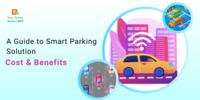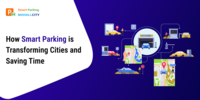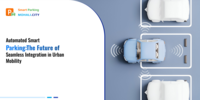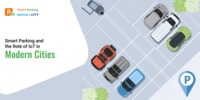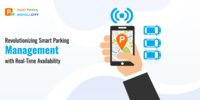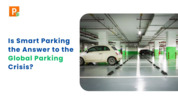- Apr 25, 2025
Share this post on:
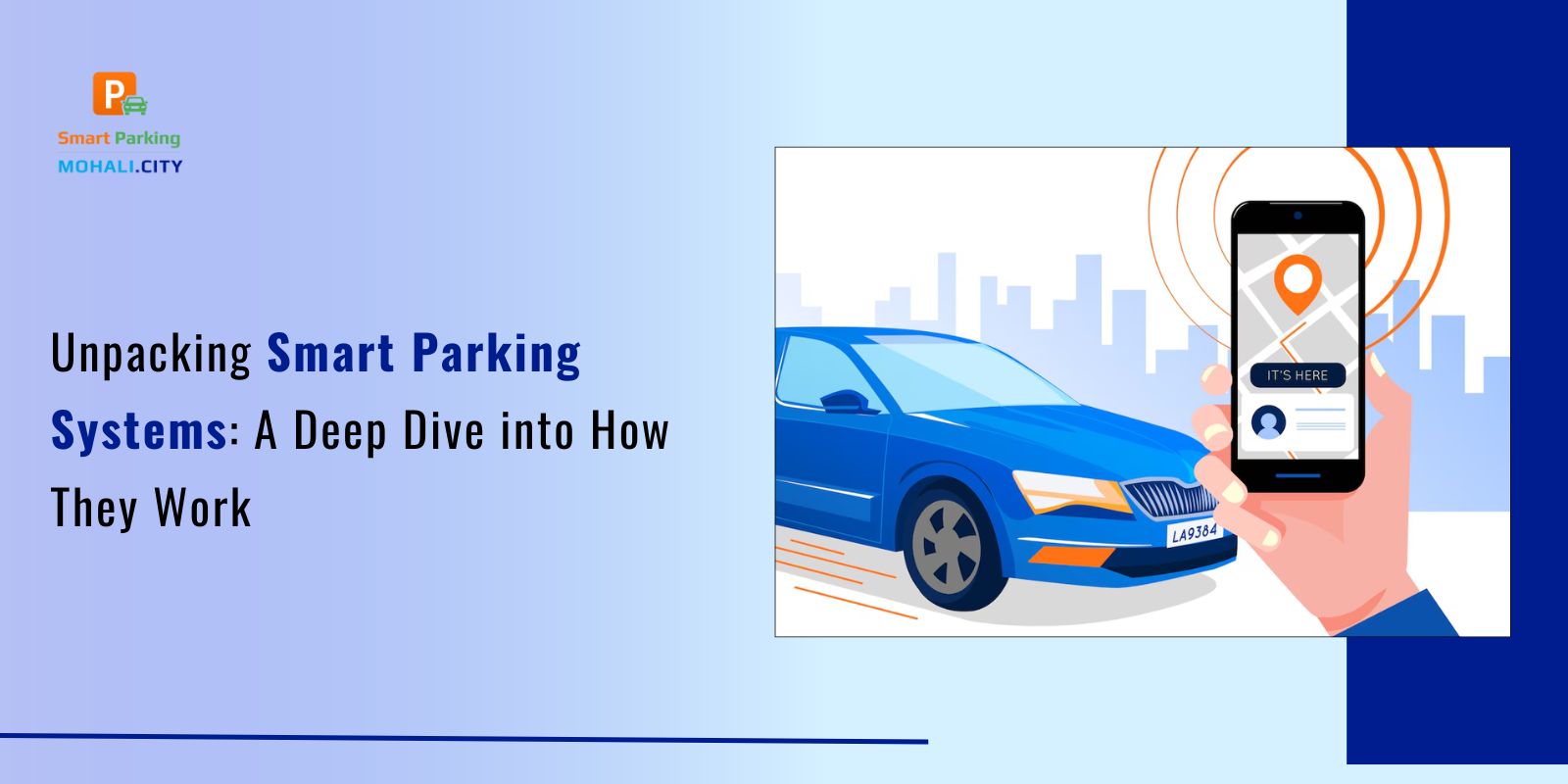
In today’s fast-paced, urbanized world, finding a parking spot has become one of the most frustrating and time-consuming tasks for drivers. As cities grow and the number of vehicles on the road increases, parking spaces are becoming more limited. This has led to higher traffic congestion, longer commute times, and unnecessary carbon emissions. Enter smart parking systems – a revolutionary approach to parking that leverages modern technology to streamline the parking process and ease congestion. In this blog, we’ll take a deep dive into how these smart parking solutions work and explore the numerous benefits they offer.
What is a Smart Parking System?
A smart parking system is a modern, technology-driven solution designed to make parking more efficient and convenient. It uses various technologies such as sensors, cameras, mobile applications, and data analytics to help drivers find available parking spaces quickly, reducing the time spent circling for a spot. Unlike traditional parking methods, smart parking solutions offer real-time parking data, automated payment systems, and even the ability to reserve parking spots in advance.
At its core, a smart parking system aims to optimize parking space utilization, reduce traffic congestion, and improve the overall parking experience for both users and urban planners.
Key Components of a Smart Parking System
To understand how a smart parking system works, it’s important to look at its key components. These systems rely on several technologies that work together to deliver a seamless parking experience. Here are the primary elements that make up a smart parking solution:
Parking Sensors
Parking sensors are the backbone of a smart parking system. These sensors are typically installed in individual parking spots or along parking lanes to detect the presence or absence of a vehicle. They use a range of technologies, including infrared, ultrasonic, and magnetic field detection, to monitor parking space occupancy. The sensors send this data to a central system, which processes the information and updates it in real time.
Data Transmission and Cloud-Based Platforms
Once the parking sensors detect the status of a parking spot (occupied or available), they transmit this data to a cloud-based platform via wireless communication networks such as Wi-Fi, Bluetooth, or cellular networks. The cloud platform processes and stores the data, making it accessible for both users and administrators.
Mobile Applications
A crucial component of smart parking solutions is the mobile app that connects users to real-time parking data. These apps allow drivers to check the availability of parking spaces before they even leave their home or office. In addition, the app can provide directions to the available parking space, help with payment, and allow users to reserve spots ahead of time.
Payment Integration
One of the most valuable features of a smart parking system is the integration of automated payment systems. Gone are the days of fumbling for loose change or waiting in line at a parking meter. With smart parking solutions, users can pay for parking through their smartphones using various digital payment options, including credit cards, mobile wallets, and even parking credits.
Data Analytics
Data collected by smart parking systems isn’t just for providing real-time information. It can also be analyzed to uncover valuable insights about parking patterns, peak usage times, and space availability. Urban planners and parking authorities can use this data to optimize parking management strategies and even adjust pricing models to balance demand.
How Do Smart Parking Solutions Work?
Let’s take a closer look at how smart parking solutions work from the moment a driver arrives at a parking facility:
Detection of Available
Parking Spots Sensors embedded in the parking spaces detect whether a parking spot is occupied or available. This data is then sent to a central server or cloud platform, where it’s processed and updated in real time. Drivers can access this data through a mobile app or a website to see which parking spaces are open.
Real-Time Information
Once the data is processed, users can access information about available parking spots through the app. Depending on the system, the app may display the exact location of the available space, or it may offer an interactive map to help guide users to nearby spots.
Navigation Assistance
Many smart parking systems include built-in navigation features that help users find available parking spaces within a parking facility or on the street. Once a driver selects a parking spot, the app provides turn-by-turn directions to guide them to the location.
Seamless Payment and Booking
With smart parking solutions, users can reserve parking spots in advance, ensuring that a space is available when they arrive. Upon arrival, payment can be made directly through the mobile app, eliminating the need for physical tickets or meters. Some systems even allow users to extend their parking time remotely if they need to stay longer.
Data Analysis for Optimization
On the backend, data analytics tools track parking patterns and usage statistics. This data can help cities and parking facility operators identify trends, such as peak parking times and popular parking areas. This information can be used to optimize parking management and even adjust pricing based on demand.
Benefits of Smart Parking Systems
The adoption of smart parking solutions brings numerous benefits, both for users and cities. Here are some of the key advantages:
Reduced Time Spent Searching for Parking
One of the most immediate benefits of smart parking systems is the reduction in time spent searching for an available spot. By providing real-time information about parking space availability, drivers can quickly find a place to park, reducing the frustration of circling the block in search of an open spot.
Decreased Traffic Congestion
When drivers spend less time searching for parking, traffic congestion in urban areas is reduced. This leads to smoother traffic flow, less stress on roads, and more efficient transportation overall. By reducing the number of cars on the road searching for parking, smart parking solutions contribute to less congestion and pollution.
Improved Parking Utilization
Smart parking systems optimize parking space usage by ensuring that spaces are used more efficiently. In many cases, parking areas are underutilized because drivers cannot find available spots. By providing real-time occupancy data, these systems ensure that parking spaces are used to their full potential.
Environmental Impact
Less time spent searching for parking means less fuel consumption and fewer greenhouse gas emissions. As cities become more focused on sustainability, smart parking solutions play a key role in reducing carbon footprints and improving air quality by minimizing unnecessary driving.
Better User Experience
Smart parking systems offer an enhanced user experience. With features like real-time data, seamless payment, and advanced booking, parking becomes a less stressful task. Users can reserve spots in advance, navigate easily to their spaces, and complete payments without leaving their cars.
Revenue Generation
For parking authorities and private operators, smart parking solutions offer a new avenue for revenue generation. Dynamic pricing, where parking costs fluctuate based on demand, can help maximize parking revenues. Additionally, the use of automated payment systems reduces the need for staff and resources.
The Future of Smart Parking
The future of smart parking systems is bright, with new technologies continuing to emerge. The integration of Artificial Intelligence (AI) and Machine Learning (ML) will further enhance the accuracy and efficiency of these systems. AI can predict parking space demand based on historical data and patterns, making parking even more efficient.
Another area of growth is the integration of electric vehicle (EV) charging stations. As the number of EVs increases, the demand for charging stations within parking facilities will grow. Smart parking solutions are being adapted to accommodate these needs, allowing users to find and reserve parking spots with EV chargers.
Furthermore, the development of autonomous vehicles (AVs) could change how smart parking solutions operate. Self-parking cars will be able to park themselves in available spots, further automating the process and increasing parking efficiency.
Conclusion
Smart parking systems are transforming the way we manage parking. With the help of advanced technologies like sensors, cloud platforms, and mobile apps, these systems make it easier for drivers to find and reserve parking spots in real-time. The benefits—ranging from reduced traffic congestion and time savings to environmental sustainability and revenue generation—make smart parking solutions an essential tool for modern cities and businesses.
As urbanization continues to rise, smart parking solutions will become even more important in ensuring efficient use of parking spaces and improving the overall driving experience. The future of parking is here, and it’s smarter than ever before.
